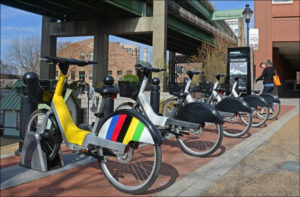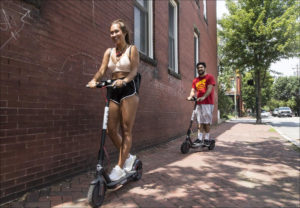
Bird Rides, Inc., a California startup, tried introducing electric scooters to Richmond’s transportation mix, scattering the two-wheelers around Virginia Commonwealth University and the downtown area. Anyone downloading an app could ride them at a cost of $1 to unlock and 20 cents per minute to ride. Workers with the city’s Department of Public Works began rounding up the scooters Thursday, reports the Richmond Times-Dispatch.

The reason? Bird Rides didn’t ask for permission first.
“The City of Richmond was not engaged in any way, as required, with respect to deployment of the scooters,” said city spokesman Tom Byrnes. “As such, Bird is being advised we will be removing them, effective immediately.”
Richmond isn’t the only city to butt heads with Bird Rides, which has pursued an act-first-ask-for-permission-later approach. San Francisco and Denver have shut down the scooter service for not having a permit.
It’s not clear from the Times-Dispatch article, however, that Bird Rides needs a permit in Richmond. Byrnes did not say precisely how the company was “required” to engage with the city. I find the vagueness of his comment troubling. Does the city code require scooters — which have never seen widespread use in the city before — to be registered or licensed? How are the electric-powered, two-wheeled scooters different from bicycles in that regard? Are electric-powered bicycles subject to the same restrictions?
Here is one city policy regarding bicycling that I could find online: “The City of Richmond does not have a local ordinance prohibiting bicycling on sidewalks. BUT, if riding on a sidewalk you must yield to pedestrians, and should ride slowly. Colliding with motorists at intersections is a leading cause of crashes because motorists aren’t expecting a bike entering the crosswalk at high speed, especially when travelling against traffic.”
If it’s legal to ride a bicycle on city sidewalks, surely it would be legal to ride a scooter on sidewalks.
Which raises another question: Is it illegal to ride scooters on city streets? Of course it isn’t. City policy promotes bicycle riding. If bicycles are legal on streets, why wouldn’t scooters be, too?
Yet another question: Do bicycle ride-sharing companies require city licenses to operate? If so, I suppose a case could be made by analogy that a scooter-sharing service would, too. Needless to say, Bird Rides attorneys will be reviewing the code to see if the shutdown is legally supported.
From a pure public policy perspective, the city’s impoundment of the scooters looks unjustified — a bureaucratic assertion of power. The city should be encouraging a wide range of transportation alternatives — not just bicycles, but electric bikes, Segways, scooters, and whatever else human ingenuity can deny. True, there may be public safety issues involved with the use of scooters on streets and sidewalks, so some kind of public oversight may be justified. But I’d like to see evidence of a problem and a full and open hearing of the issues before city officials arbitrarily shut down a promising transportation alternative.

Leave a Reply
You must be logged in to post a comment.